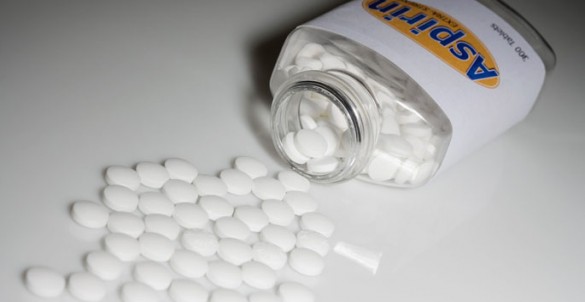For years, scientists have known that regular aspirin use may reduce the risk of cancer.
“Studies have shown that aspirin administration for five or more years reduces the incidence of all cancers by 38 percent,” said Pierre Massion, M.D., professor of Medicine and Cancer Biology and director of the Thoracic Program at Vanderbilt-Ingram Cancer Center.

The benefit is seen even at the low doses of aspirin (typically 81 mg daily) recommended for patients for a variety of ailments or healthcare risks.
Aspirin was thought to work by inhibiting the cyclooxygenase-1 (COX-1) molecular pathway in cells. COX-1 is an enzyme expressed in most tissues in the body.
However, a new study led by John Oates, M.D., Thomas F. Frist Sr. Professor of Medicine, Olivier Boutaud, Ph.D., research associate professor of Pharmacology, and Massion found that low-dose aspirin appears to work by inhibiting both COX-1 and COX-2 pathways.
Massion presented the data at the 13th Annual AACR International Conference in Cancer Prevention Research, held Sept. 28 – Oct. 1 in New Orleans.
The authors wanted to determine whether low-dose aspirin worked by blocking platelet function by inhibiting the COX-1 pathway, and if it also reduced levels of prostaglandin E2 (PGE2), by inhibiting the COX-2 pathway.
The PGE2 molecule is linked to the spread of cancer, also known as metastasis.
“We found that potency of low-dose aspirin in inhibiting COX-2 in the tumor cells is as great or greater than its potency of COX-1 in the platelet,” said Oates. “This indicates that at a cellular level, aspirin is not selective for the platelet but could also block COX-2 in cancers.”
The finding that aspirin also is important as a COX-2 inhibitor is likely surprising to most investigators, according to Massion.
“Our findings may explain how even a very low dose of aspirin taken daily can produce such a substantial reduction in cancer deaths and metastasis,” said Massion.
The researchers used urine samples from 54 patients who took 81 mg aspirin tablets for two weeks and demonstrated that aspirin inhibited PGE2 production by 45 percent and prostacyclin by 37 percent, as measured by their urinary metabolites.
The investigators also found that in blocking COX-1, aspirin also interfered with the platelets’ ability to stick to cancer cells to prevent metastasis.
This suggests that the two mechanisms act together to reduce the risk of cancer death.
This study has not yet been published in a peer-reviewed journal.
The research was supported by an American Heart Association National Fellow to Faculty Award (13FTF17400011), the National Cancer Institute, which is a division of the National Institutes of Health (CA 090949, CA 102353), and the Department of Defense (#W81XWH-10-1-1007).















